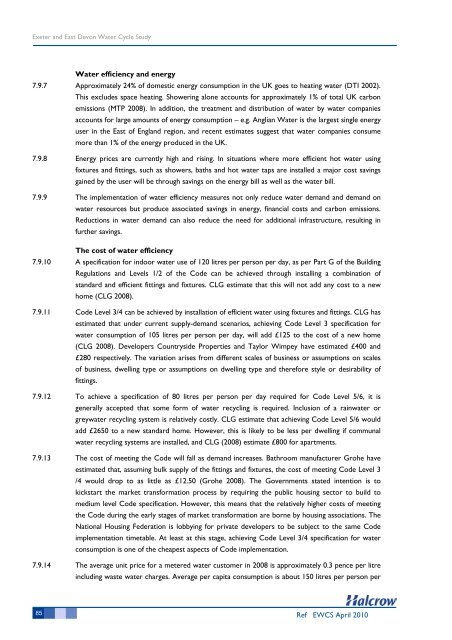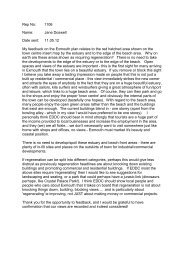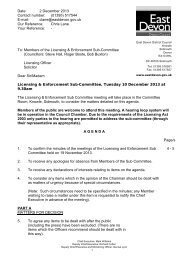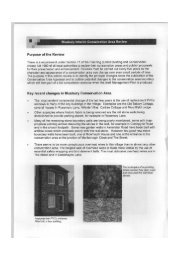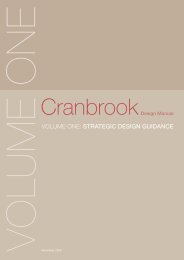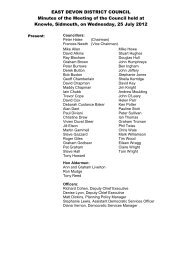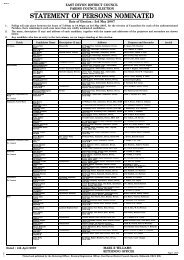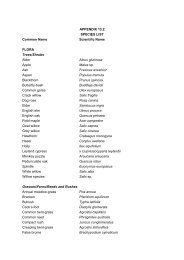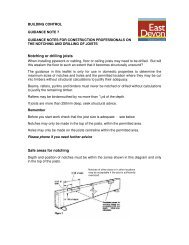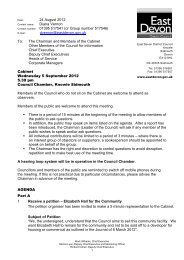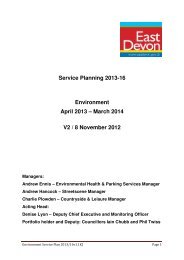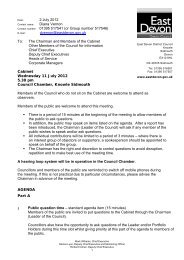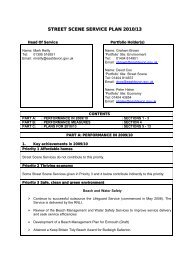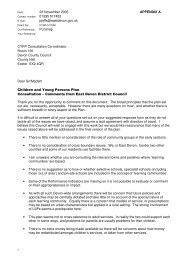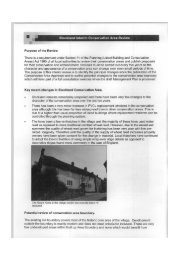Water Cycle Study - East Devon District Council
Water Cycle Study - East Devon District Council
Water Cycle Study - East Devon District Council
You also want an ePaper? Increase the reach of your titles
YUMPU automatically turns print PDFs into web optimized ePapers that Google loves.
Exeter and <strong>East</strong> <strong>Devon</strong> <strong>Water</strong> <strong>Cycle</strong> <strong>Study</strong><br />
<strong>Water</strong> efficiency and energy<br />
7.9.7 Approximately 24% of domestic energy consumption in the UK goes to heating water (DTI 2002).<br />
This excludes space heating. Showering alone accounts for approximately 1% of total UK carbon<br />
emissions (MTP 2008). In addition, the treatment and distribution of water by water companies<br />
accounts for large amounts of energy consumption – e.g. Anglian <strong>Water</strong> is the largest single energy<br />
user in the <strong>East</strong> of England region, and recent estimates suggest that water companies consume<br />
more than 1% of the energy produced in the UK.<br />
7.9.8 Energy prices are currently high and rising. In situations where more efficient hot water using<br />
fixtures and fittings, such as showers, baths and hot water taps are installed a major cost savings<br />
gained by the user will be through savings on the energy bill as well as the water bill.<br />
7.9.9 The implementation of water efficiency measures not only reduce water demand and demand on<br />
water resources but produce associated savings in energy, financial costs and carbon emissions.<br />
Reductions in water demand can also reduce the need for additional infrastructure, resulting in<br />
further savings.<br />
The cost of water efficiency<br />
7.9.10 A specification for indoor water use of 120 litres per person per day, as per Part G of the Building<br />
Regulations and Levels 1/2 of the Code can be achieved through installing a combination of<br />
standard and efficient fittings and fixtures. CLG estimate that this will not add any cost to a new<br />
home (CLG 2008).<br />
7.9.11 Code Level 3/4 can be achieved by installation of efficient water using fixtures and fittings. CLG has<br />
estimated that under current supply-demand scenarios, achieving Code Level 3 specification for<br />
water consumption of 105 litres per person per day, will add £125 to the cost of a new home<br />
(CLG 2008). Developers Countryside Properties and Taylor Wimpey have estimated £400 and<br />
£280 respectively. The variation arises from different scales of business or assumptions on scales<br />
of business, dwelling type or assumptions on dwelling type and therefore style or desirability of<br />
fittings.<br />
7.9.12 To achieve a specification of 80 litres per person per day required for Code Level 5/6, it is<br />
generally accepted that some form of water recycling is required. Inclusion of a rainwater or<br />
greywater recycling system is relatively costly. CLG estimate that achieving Code Level 5/6 would<br />
add £2650 to a new standard home. However, this is likely to be less per dwelling if communal<br />
water recycling systems are installed, and CLG (2008) estimate £800 for apartments.<br />
7.9.13 The cost of meeting the Code will fall as demand increases. Bathroom manufacturer Grohe have<br />
estimated that, assuming bulk supply of the fittings and fixtures, the cost of meeting Code Level 3<br />
/4 would drop to as little as £12.50 (Grohe 2008). The Governments stated intention is to<br />
kickstart the market transformation process by requiring the public housing sector to build to<br />
medium level Code specification. However, this means that the relatively higher costs of meeting<br />
the Code during the early stages of market transformation are borne by housing associations. The<br />
National Housing Federation is lobbying for private developers to be subject to the same Code<br />
implementation timetable. At least at this stage, achieving Code Level 3/4 specification for water<br />
consumption is one of the cheapest aspects of Code implementation.<br />
7.9.14 The average unit price for a metered water customer in 2008 is approximately 0.3 pence per litre<br />
including waste water charges. Average per capita consumption is about 150 litres per person per<br />
85 Ref EWCS April 2010


